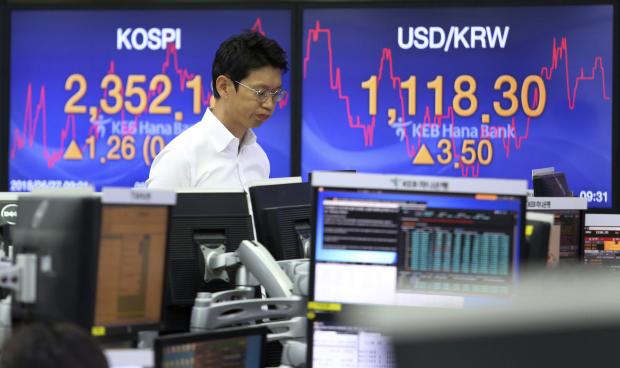
A currency trader watches monitors at the foreign exchange dealing room of the KEB Hana Bank headquarters in Seoul, South Korea, Wednesday, June 27, 2018. Asian markets were mostly lower on Wednesday as jitters over trade conflicts between the world’s major economies lingered. (Photo by AHN YOUNG-JOON / AP)
SEOUL, South Korea — Global markets were lower on Wednesday, with Chinese stocks leading the declines as jitters over trade conflicts between the world’s largest economies lingered. Oil prices extended their gains as the US pushed other countries to cut oil imports from Iran.
Keeping score
Britain’s FTSE 100 fell 0.3 percent in early trading to 7,516.46 while Germany’s DAX slipped 0.8 percent to 12,138.17. France’s CAC 40 was down 0.6 percent at 5,250.34. Futures augured losses on Wall Street. S&P futures dropped 0.7 percent and Dow futures declined 0.8 percent.
Asia’s day
Chinese stocks were the biggest losers, with the Shanghai Composite Index sinking 1.1 percent to 2,813.18.
The index is the worst performer among major markets this year, losing 14 percent since the start of this year. Hong Kong’s Hang Seng tumbled 1.8 percent to 28,356.26.
Japan’s Nikkei 225 fell 0.3 percent to 22,271.77 and South Korea’s Kospi dropped 0.4 percent to 2,342.03. Australia’s S&P-ASX 200 edged down less than 0.1 percent to 6,195.90. Stocks in Taiwan, Singapore and other Southeast Asian markets were mostly lower.
Chinese bears
China’s market benchmark has tumbled into bear territory as trade tensions with Washington spook investors.
The Shanghai Composite Index’s closing Tuesday was just over 20 percent below its Jan. 24 peak. The South China Morning Post newspaper in Hong Kong noted that has wiped out $1.6 trillion in stock value – bigger than Canada’s annual economic output.
The biggest decliners have included telecoms and tech companies that might be hurt by U.S. President Donald Trump’s proposed restrictions on access to US markets and technology.
Analysts said a combination of factors such as jitters over trade conflicts, Beijing’s move to tighten liquidity and signs of growth momentum losing steam also contributed to the sell-off.
Analyst’s take
“To a large extent, the Chinese market is one driven by speculation,” said Jingyi Pan, a market strategist at IG in Singapore. “With sentiment rolling over itself of late, particularly over the escalating trade tensions that seem to have no end, it should be of little surprise to find the market crumbling.”
He added that “the growth momentum presents the image of stalling in China that altogether amalgamates to an attack on investors’ confidence.”
China-Us trade
China announced a tariff cut for imported soybeans and some other grains from Asian countries in a possible measure to replace US supplies in the event Beijing’s trade dispute with Washington escalates.
Beijing has announced plans to hike tariffs on US soybeans, for which China is the biggest export market, in response to Trump’s threat of import duty increases on Chinese goods.
The tariff on soybeans will be cut by half to 1.5 percent effective July 1 and those on some other crops such as rapeseed will fall from as much as 9 percent to as low as zero.
The quote
Wendy Liu, Nomura’s head of China equity research, said some agreement on US-China trade before the US mid-term election was anticipated and the Chinese stock market was forecast to calm down during the summer earnings season.
But for the moment, “with lack of visibility on the U.S.-China trade conflict and some renewed concerns over growth outlook, few are willing to step in and step up right away.”
Oil
Benchmark US crude gained 21 cents to $70.74 per barrel in electronic trading on the New York Mercantile Exchange.
The contract added 3.6 percent to finish at $70.53 a barrel in New York on Tuesday.
Brent crude, used to price international oils, added 7 cents to $76.21 per barrel in London. It rose 2.1 percent to settle at $76.14 per barrel in the previous session.
Trump, who withdrew the US from an Iran nuclear deal in May, is pushing foreign nations to cut their oil imports from the country to zero by November, when sanctions on Iran’s energy sector will kick in again.
Currencies
The dollar fell to 109.80 yen from 110.03 yen. The euro weakened to $1.1624 from $1.1646.